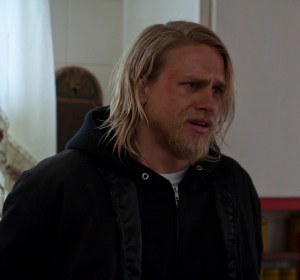
FX
Spoilers for last night’s Sons of Anarchy coming up:
The last image before the title sequence in “Bainne” is of blood spattered across a crucifix hanging on a wall: “Who do you think has to clean that up?” That, in a way—the religious imagery set aside—is the driving question of Sons of Anarchy.
There is a history of blood, and that bloodshed requires further bloodshed as retribution, or to rectify the problems created by the previous bloodshed, and that in turn means more bloodshed down the line. There’s never really a resolution, just a longer and longer trail of blood, stretching, as we have seen, across oceans and across generations. It’s like some gory twist on The Cat in the Hat Comes Back, in which every mess can only be cleaned up by another, bigger mess. (This too was the pattern of The Shield, which SoA creator Kurt Sutter wrote for.)
But what if it were possible to break that chain of blood? That was the initial question of SoA, in which Jax began questioning the violent, criminal ways of SAMCRO, and learned that his father before him had tried to change it. One thing led to another, however—one bloody mess after the next—and Jax has over three seasons seemed to be so far along his violent path that there was no chance of his returning to his father’s way.
But what if he could end the pattern—not for himself, but for his son? What if Abel’s disappearance offers the chance to let his son have the life he could not himself?
When Jax went off to Belfast to find his son, he did not expect to find himself confronting this choice (nor, at least, did I). But he came face to face with it when observing his son in the arms of his prospective adoptive parents, the Petries, in what was the most powerful scene in season 3 to date. Having crossed an ocean, cut deals, killed to be close to his son again, Jax was close enough to touch him—and tortured by the thought that, maybe, it would be best if his didn’t. It was a beautiful, agonizing scene, and Charlie Hunnam made us feel Jax’s heartbreak and conflict at the thought of tearing his baby from what might be a much better life. (OK, having Mr. Petrie actually give money to a homeless woman may have been laying it on a bit thick, but I’ll let it go, considering.)
One thing that I’ve found lacking in season 3 is—besides the waiting to get to Belfast and the detachment of the Charming storylines from the main one—it’s seemed to get away from that central conflict (which, truth be told, really started happening back in season 2, as Jax was swept up in the hunt for Zobelle). Without the question of whether Jax follows his dad’s way, or Gemma and Clay’s way, or some third way he comes by himself is what has made SoA fascinating beyond the action, the writing and the setting. Without it, you just have a thriller about a motorcycle-gang scion dealing with family issues and trying to defeat his enemies—which, admittedly, may be all that a lot of SoA’s fans want, and perhaps therein lies the tension.
That it so powerfully used Abel’s disappearance to return to this question is why “Bainne” is probably my favorite season 3 episode to date. But it’s also why I have to wonder about where the show is going from here. As Jax surveys the corpses of the Petries and says, “I did this,” it amounts to saying that Abel could never have had the life Jax wanted for him, and that Jax’s responsibility was to accept the bloody lifestyle that was fated to him—and thus, to Abel.
Now the big question is whether that life is his actual fate, or if Jax is just reading it that way in the moment. To my way of thinking, SoA is greatest as a story when we know that Jax has a choice—that, in fact, his choice is the story. To have that choice essentially made for him—by saying that he simply has to embrace SAMCRO as it is for everyone’s good—would rob the story of its moral power. (To use David Simon’s favorite frame for The Wire, SoA is not a Greek drama like Simon’s in which the characters are driven by fate, it’s Shakespearean—literally, it’s Hamlet—so psychology and individual will matter.)
Mind you, I’m not saying that’s what SoA is doing, as opposed to the way Jax is interpreting the moment. The fact that it’s still up for interpretation is what makes SoA a great show rather than just an entertaining one. “I’m done listening to dead men,” Jax says, supposedly giving up for good on his father’s philosophy. (A decision that may or may not be underscored by the outcome of the Tara cliffhanger.)
But I’m guessing, and hoping, there’s more to the story than that. You can plug your ears, but you can never entirely ignore the dead men. The marks of their stories are still spattered on the wall.


